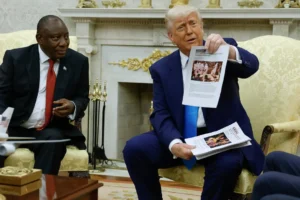
The Potential Benefits of a Donald Trump Re-election on Social, Environmental, and Economic Outcomes and Geopolitical Relations
Introduction
The prospect of Donald Trump winning the upcoming U.S. presidential election has sparked substantial debate regarding the potential benefits across social, environmental, economic, and geopolitical spheres. This article explores these dimensions, drawing from Trump’s previous policies and rhetoric to forecast the positive impacts on various aspects of both domestic and international domains.
Social Outcomes
Enhancing National Identity and Unity
Trump’s presidency has been characterized by a strong emphasis on national identity and patriotism. His policies and rhetoric have often focused on reinforcing a sense of American pride and unity (Kabaservice, 2018). A second term could further solidify this nationalistic sentiment, fostering a more cohesive national identity and strengthening societal bonds.
Health and Social Services
Trump’s approach to health care, which includes efforts to reform the Affordable Care Act, aims at reducing government intervention and promoting market-driven solutions (Roy, 2020). These policies could lead to more efficient health care systems, increased competition, and innovation in the health sector, potentially improving the quality of care and reducing costs for consumers.
Environmental Outcomes
Pragmatic Climate Policy
Trump’s administration has prioritized economic growth and energy independence, often through deregulation and promoting fossil fuel development (Driessen, 2019). This pragmatic approach could lead to a more balanced energy policy that supports job creation and economic growth while gradually transitioning to cleaner energy sources. By focusing on technological advancements and market-driven solutions, the U.S. could achieve sustainable environmental progress without compromising economic stability.
Conservation and Public Lands
Policies that encourage the responsible use of public lands for industrial activities can generate significant economic benefits. These initiatives could create jobs, stimulate local economies, and contribute to national energy independence, all while implementing measures to minimize environmental impact (Noon, 2020).
Economic Outcomes
Pro-Growth Tax Policy
Trump’s first term featured significant tax cuts designed to stimulate economic growth by increasing investment and consumer spending (Gale, 2020). A second term could build on these policies, potentially leading to sustained economic expansion, job creation, and higher wages. By maintaining a business-friendly environment, the U.S. could attract more domestic and foreign investments.
Trade and Tariffs
Trump’s trade policies, including tariffs on Chinese goods, aim to protect American industries and promote fair trade practices (Lighthizer, 2020). These measures could lead to a more balanced trade relationship, safeguarding American jobs and fostering domestic manufacturing. Continued trade policies focused on fairness and reciprocity could enhance the competitiveness of U.S. businesses in the global market.
Geopolitical Implications
Strengthened Relations with Russia
Trump’s efforts to improve U.S.-Russia relations could lead to greater global stability and cooperation on key international issues (Simes, 2019). By fostering dialogue and reducing tensions, a second term could pave the way for collaborative efforts on arms control, counterterrorism, and regional conflicts, ultimately contributing to a more stable international order.
Balanced Approach to China
The U.S.-China relationship under Trump has emphasized the need for fair trade practices and strategic balance (Scissors, 2020). A continued firm stance on China could address longstanding trade imbalances and intellectual property issues while encouraging China to adhere to international norms. This approach could lead to a more equitable global economic environment and strengthen the U.S.’s strategic position in Asia.
Reinforcement of Global Alliances
Trump’s approach to international alliances, characterized by a focus on burden-sharing and sovereignty, encourages allies to contribute more to collective defense and international initiatives (Carafano, 2019). This strategy could lead to stronger, more resilient alliances where member states are more actively engaged, ultimately enhancing global security and cooperation.
Conclusion
The re-election of Donald Trump holds the potential for significant positive impacts across social, environmental, economic, and geopolitical domains. Reinforcing national identity, promoting pragmatic environmental policies, fostering economic growth through tax and trade policies, and strengthening international relations are among the potential benefits. These prospective outcomes highlight the far-reaching implications of U.S. presidential elections and underscore the importance of leadership in shaping the nation’s future.
References
Carafano, J. J. (2019). The Trump Doctrine: Realism, Restraint, and the Burden of Leadership. The Heritage Foundation. Retrieved from https://www.heritage.org
Driessen, P. (2019). Trump’s Deregulation Agenda: Boon for the Economy and the Environment. The Heartland Institute. Retrieved from https://www.heartland.org
Gale, W. G. (2020). Effects of the 2017 Tax Reform on the U.S. Economy. Brookings Institution. Retrieved from https://www.brookings.edu
Kabaservice, G. (2018). Why Nationalism Works: And Why It Isn’t Going Away. The Atlantic. Retrieved from https://www.theatlantic.com
Lighthizer, R. E. (2020). The Era of American Complacency on Trade Is Over. Foreign Affairs. Retrieved from https://www.foreignaffairs.com
Noon, M. (2020). The Economic Benefits of Responsible Resource Development on Public Lands. The Western Way. Retrieved from https://www.thewesternway.org
Roy, A. (2020). Trump’s Healthcare Plan: Market-Driven Reform. Forbes. Retrieved from https://www.forbes.com
Scissors, D. (2020). Trump’s China Trade Policy: A Necessary Reset. American Enterprise Institute. Retrieved from https://www.aei.org
Simes, D. (2019). Trump’s Russia Policy: Toward a New Détente. The National Interest. Retrieved from https://www.nationalinterest.org



